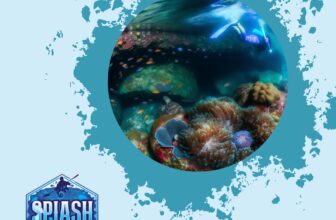
Scuba diving is undoubtedly one of the most exhilarating experiences for adventure seekers. The marine life, crystal-clear water, and vibrant coral reefs offer an unparalleled view that you won’t find anywhere else in the world.
From swimming alongside sea turtles to observing schools of fish swim by in perfect unison, these underwater adventures create lifelong memories. However, while scuba diving sounds like a blast to some people, others might feel nervous or anxious about it.
It’s natural to feel apprehensive about diving into unknown territory and trusting your life support system with unfamiliar equipment at depths beyond where humans can naturally survive. But don’t worry; with some preparation and guidance, even those who experience fear or anxiety can learn how to stay calm while scuba diving.
Excitement Beyond the Surface
Picture yourself exploring a vast underwater world filled with stunning colors and vibrant creatures you never would have seen otherwise. You’re weightless as you move effortlessly through the water, enveloped by a sense of tranquility and wonder that only nature can provide.
It’s hard not to be captivated by the allure of scuba diving once you’ve experienced it firsthand. Whether you’re a seasoned diver or just starting out on your journey, there’s no denying that the thrill of discovering new marine life deep below the surface is eternally enticing.
The Nervousness Around Scuba Diving
Despite all its beauty and excitement, scuba diving can also be intimidating for those who have never gone before. Maybe they’re worried about putting their trust in unfamiliar equipment or not knowing how to navigate underwater properly. Others may feel nervous about having trouble breathing underwater or struggling with feelings of claustrophobia in tight spaces such as caves or wrecks.
But don’t let these fears stop you from experiencing everything that scuba diving has to offer! With the right mindset, preparation, and guidance, you can overcome these fears and feel confident while exploring the underwater world.
The Fear Factor
If you’re new to scuba diving, it’s natural to feel a bit nervous or even scared. After all, you’re about to explore an entirely different world underwater! Some of the most common fears associated with scuba diving include drowning, claustrophobia, and equipment malfunction.
Drowning is probably the biggest fear for most beginners. It’s understandable – being underwater can be a scary thought if you’re not used to it.
However, it’s important to remember that scuba diving is actually one of the safest sports out there. With proper training and equipment, the risk of drowning is incredibly low.
Another common fear is claustrophobia. The thought of being enclosed in a small space can be overwhelming for some people.
But once again, with proper training and preparation, this fear can be easily overcome. In fact, many people report feeling a sense of freedom when they’re surrounded by water.
Equipment malfunction is another concern for many divers. What if your regulator fails or your tank runs out of air?
While these scenarios may sound scary on paper, they are extremely rare in practice. Plus, every diver learns how to deal with these situations during their training.
Why These Fears Don’t Hold Water
As we’ve already mentioned, scuba diving is one of the safest sports out there thanks to its rigorous training and strict safety guidelines. In fact, according to statistics from Divers Alert Network (DAN), only 1 out of every 211 thousand dives results in a fatality due to an equipment malfunction. It’s also worth noting that much of our fear surrounding scuba diving comes from our own minds rather than any actual danger in the water itself.
Our brains are wired to protect us from perceived threats – even ones that aren’t actually there! That’s why it’s important to focus on facts rather than emotions when it comes to diving.
Furthermore, the vast majority of dive-related accidents and injuries can be traced back to human error rather than equipment malfunction. This means that by following proper safety protocols, you can greatly reduce your risk of injury or mishap while underwater.
Overall, while it’s natural to feel a bit nervous before your first dive, the reality is that scuba diving is actually incredibly safe. By understanding and addressing your fears head-on, you’ll be able to enjoy all the beauty and wonder that lies beneath the surface.
Preparation is Key
Emphasize the importance of proper training and certification
One of the most critical aspects of scuba diving preparation is obtaining proper training and certification. Before embarking on a dive, it’s essential to enroll in a course with a reputable diving school or instructor.
Not only will this ensure that you have the necessary skills to dive safely, but it will also give you the confidence needed to enjoy your experience fully. During your training, you’ll learn about things like equipment usage, safety techniques, and underwater communication.
Your instructor will emphasize the importance of following established protocols and procedures to minimize risk. A good instructor will also advise you on what type of equipment is best suited for your skill level and needs.
Highlight the benefits of familiarizing oneself with equipment and procedures before diving
Aside from obtaining certification, familiarizing yourself with your gear can help ease anxiety when scuba diving. It’s essential to understand how everything works so that if something goes wrong during the dive, you know precisely what steps to take.
Before hitting the water, take some time to become intimately acquainted with all parts of your equipment. Practice putting on your wetsuit, setting up your regulator, checking air levels in tanks while taking slow deep breaths in sync with each other ensures everyone understands how their gear works before entering deeper depths
Understanding essential procedures such as hand signals for communication between divers can make a significant difference throughout a dive session in terms of safety. With good preparation practices when scuba diving can be an experience filled with excitement while ensuring divers stay safe at all times.
Conclusion
As we’ve seen in this article section about scuba diving preparation being key; Proper training leading up to certification from reputable instructors is crucial for building confidence through knowledge while getting intimately familiarized with all aspects of gear used is essential to ease anxiety once in the water. By taking the time to understand and appreciate the importance of these elements, divers can enjoy a safe and unforgettable adventure underwater.
Mind Over Matter: Tips for Staying Calm Underwater
Scuba diving can be a nerve-wracking experience, especially for those who are new to the sport. However, it’s important to remember that fear is often just a state of mind. With the right mindset and techniques in place, it’s possible to manage anxiety and stay calm while underwater.
Deep Breathing
One of the most effective ways to calm nerves and reduce anxiety is through deep breathing. When we’re anxious or stressed, our breathing tends to become shallow and rapid.
This only exacerbates feelings of panic and dread. To combat this, try taking slow, deep breaths while focusing on your inhales and exhales.
Try counting to four as you inhale through your nose, then count to six as you exhale through your mouth. Repeat this process until you feel your heart rate begin to slow down.
Positive Self-Talk
Another powerful tool for managing anxiety is positive self-talk. When we’re nervous or scared, we tend to focus on all the things that could go wrong. This negative self-talk only reinforces our fears and makes us feel worse.
Instead of dwelling on negative thoughts, try replacing them with positive affirmations. Tell yourself things like “I am capable,” “I am safe,” or “I am in control.” Repeat these affirmations in your head as often as needed until you start to believe them.
Visualization Techniques
Visualization techniques can also be incredibly helpful when it comes to managing anxiety while scuba diving. Before entering the water, take some time to close your eyes and visualize yourself feeling calm and confident underwater.
Envision each step of the dive going smoothly – from gearing up on the boat to descending into the water and exploring the reef below. Picture yourself enjoying every moment of the experience and feeling a sense of accomplishment when you resurface.
By practicing deep breathing, positive self-talk, and visualization techniques, you can help calm your nerves and stay focused while diving. Remember that fear is often just a state of mind – with the right mindset and tools in place, you can conquer your fears and enjoy all the beauty that scuba diving has to offer.
Dive with a Buddy
The Importance of Having a Dive Buddy for Safety Reasons
Scuba diving is a thrilling and exciting sport, but it’s not without risks. That’s why it’s essential to have a dive buddy whenever you go underwater.
Your dive buddy is responsible for watching your back and vice versa. In case of any emergency, your buddy can help you or signal for help.
This simple reason is why being alone while diving is never safe. Having a dive buddy also means that you have someone to share in the experience with, which can make the whole activity much more enjoyable.
It’s always fun to be able to share stories and memories of your adventures with someone who was there with you. Plus, having a buddy gives you the opportunity to take photos or videos of each other while enjoying the view underwater.
How Having Someone Else Can Also Be Comforting
Apart from safety reasons, having someone else around while scuba diving can also be incredibly comforting, especially if you’re prone to anxiety or nervousness about being underwater. Knowing that there’s someone close by who will help if something goes wrong can provide peace of mind and allow you to relax more fully into the experience. Furthermore, when diving with a buddy, it’s easier to stay aware of your surroundings because they too are looking around at what’s going on in their immediate area.
You might even spot some rare marine life together and be able to point out things that one person alone might miss. All in all, having a dive buddy not only makes scuba diving safer but also adds another layer of enjoyment when sharing an unforgettable adventure together!
Take it Slow
Encourage beginners to start with shallow dives in calm waters
So you’ve completed your training and you’re ready for your first dive. It’s important to remember that scuba diving can be an intimidating experience, especially for beginners. That’s why it’s recommended to start off with shallow dives in calm waters.
This will give you the opportunity to get used to breathing underwater and become familiar with your surroundings without feeling overwhelmed. Shallow dives are also a great way to explore the colorful marine life that inhabits shallow reefs.
You’ll have the chance to see everything from schools of tropical fish, crustaceans, and even small sharks! Additionally, many popular dive destinations offer beginner-friendly locations where instructors can guide you through your first dive.
Remind divers that it’s okay to take breaks or end a dive early if needed
It’s important for divers of all skill levels to remember that there is no shame in taking things slow or ending a dive early if needed. Scuba diving should be an enjoyable experience, not something that causes undue stress or anxiety.
If at any point during a dive you feel uncomfortable or overwhelmed, don’t hesitate to communicate this with your dive buddy or instructor. Taking breaks as needed is also perfectly acceptable – after all, scuba diving can be physically demanding and it’s important to listen to your body.
Remember: safety should always come first when scuba diving. If at any point continuing with a particular dive feels unsafe or risky, don’t hesitate to call it quits and try again another time.
Conclusion
Taking things slow when scuba diving is key – especially for beginners. Starting off with shallow dives in calm waters will help ease any anxiety and allow you ample time to become comfortable underwater before moving on to more advanced dives.
Additionally, it’s important to remember that there’s no shame in taking breaks or ending a dive early if needed. At the end of the day, scuba diving should be an enjoyable and safe experience for everyone involved!
Conclusion: Dive in with Confidence
Scuba diving can be an exhilarating experience, but it’s understandable to feel anxious or nervous about it. By understanding your fears, preparing yourself with proper training and equipment, and taking things slow as you begin your diving journey, you can overcome those nerves and enjoy all the beauty that lies beneath the surface.
Remember to stay calm underwater by focusing on your breathing and techniques like visualization. Having a dive buddy is also crucial for safety reasons, but it can also provide a sense of comfort while exploring the depths below.
And if at any point you need to end a dive early or take a break, that’s perfectly okay – everyone moves at their own pace. Above all, remember to enjoy the experience!
Scuba diving offers a unique opportunity to explore parts of our world that many never get to see. With these tips in mind, you can dive in with confidence and create memories that will last a lifetime.
So why not give scuba diving a try? You might just discover your new favorite hobby.







